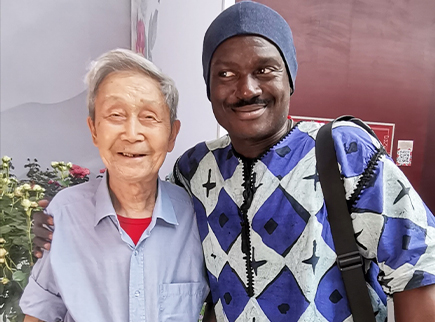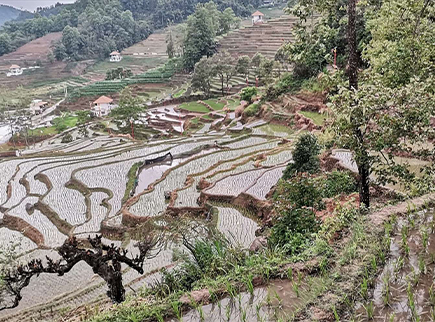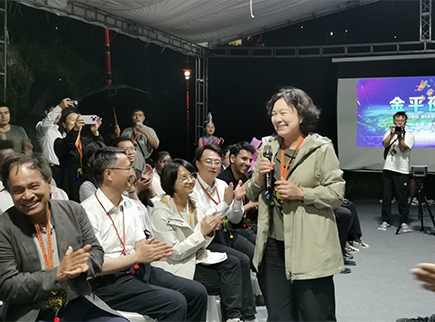Longer life remains a universal aspiration, symbolising dignity and fulfilment in many societies.
The academic field has long explored factors influencing longevity, given their complexity.
In China, various theories on longevity—collectively known as Longevity Theory—include movement (exercise), quietism (rest and meditation), life rhythm and harmony, and vitality.

Studies indicate that lifespan results from genetics, lifestyle, diet, healthcare, socio-economic status, heredity, and environment.
“Among these factors, the environment is extremely important,” says Professor Wuyi Wang, a researcher at the Institute of Geographic Sciences and Natural Resources Research of the Chinese Academy of Sciences, and co-Director of FORHEAD
Ancient Chinese recognised the link between lifespan and environment over 2,000 years ago.
Modern studies identify climate, longitude, soil type, and crop agrotype as key environmental factors influencing longevity in China.
An integrated study using health geography methods analysed China’s longevity areas.
Led by Asia’s leading scientists such as Wuyi Wang, Yonghua Li, Hairong Li, Jiangping Yu, Linsheng Yang, and Li Wang, the research found longevity zones mainly in Sichuan-Chongqing, the central plain, and the southeast region.
This first quantitative study on longevity and environmental factors provides insights into ecological civilisation development.
Findings revealed longevity areas have weakly alkaline drinking water with moderate selenium (Se), iron (Fe), and potassium (K), higher calcium (Ca), carbon monoxide (Co), and manganese (Mn), and lower chromium (Cr) and cadmium (Cd).
Trace elements in soil and food staples enhance health benefits.
Hair samples from centenarians showed higher lithium (Li), magnesium (Mg), calcium (Ca), and zinc (Zn), but lower cadmium (Cd), chromium (Cr), copper (Cu), and nickel (Ni).
The study highlights socio-environmental advantages such as physiological health, psychological well-being, light meals, and high vegetable intake.
Jinping County exemplifies China’s environmental longevity model.
Bordering Vietnam, the mountainous county spans 3,677 square kilometres, with only 10.14 square kilometres of flatland.
Jinping has 400,000 residents across 13 townships, including 48 centenarians—the highest concentration in China. The average lifespan is 79.3 years.
“People live long, healthy lives in this county. We are Yunnan’s only ‘China Longevity Homeland.’
“In Jinping, you can breathe air rich in 50,000 negative oxygen ions per cubic centimetre and drink water with 118 milligrams per litre of metasilicic acid,” Yu Yulong, Secretary of the Communist Party of China (CPC)’s Jinping County Committee, told the Ghana News Agency (GNA) in an interview.
The county produces abundant longevity fruits from 400,000 acres of orchards, including bananas, passion fruit, jackfruit, and sticky corn.
Jinping’s rich biodiversity contributes significantly to its health benefits.
“Jinping is known as the Biological Gene Bank of Southern Yunnan, boasting 2,567 species of higher plants across 913 genera in 223 families,” Yu notes.

The county has 24 mineral types, including gold, copper, iron, and nickel, making up 45.28 per cent of Honghe Prefecture’s minerals.
Jinping is also known for its geothermal hot springs, with the Mengla Hot Spring ranked among China’s top ten natural hot springs.
Its 15 water intake points contain metasilicic acid at 30 milligrams per litre, rich in longevity-supporting elements like selenium, strontium, and germanium, meeting natural mineral water standards.
Recognised as China’s Butterfly Capital, Honghe Butterfly Valley houses over 320 butterfly species.
Millions of butterflies emerge in May and June, creating a rare ecological spectacle that attracts over 200,000 tourists annually.
Ms. Hua Chunying, Vice Minister of China’s Foreign Ministry, in an interaction with foreign journalists, on the sideline of her working visit to Jinping, reaffirmed government efforts to improve Jinping’s living conditions.
“For 33 years, with the dedicated support of the Ministry, assistance of friendly foreign governments and institutions worldwide, as well as the collective efforts of compassionate individuals across society, Jinping has undergone a remarkable transformation.
“Today, the county has been revitalised that farmers’ income have grown substantially, living standards have improved dramatically, and public services in education, healthcare, and Transportaion have been elevated.
“Boundless compassion warms the frontier, sincere dedication showers mountain villages. In these fleeting yet fruitful three decades, with the steadfast support from the Ministry and partners worldwide, Jinping has blossomed into a symbol of hope.
“We firmly believe our country’s future will shine brighter than ever,” Ms. Hua noted.

